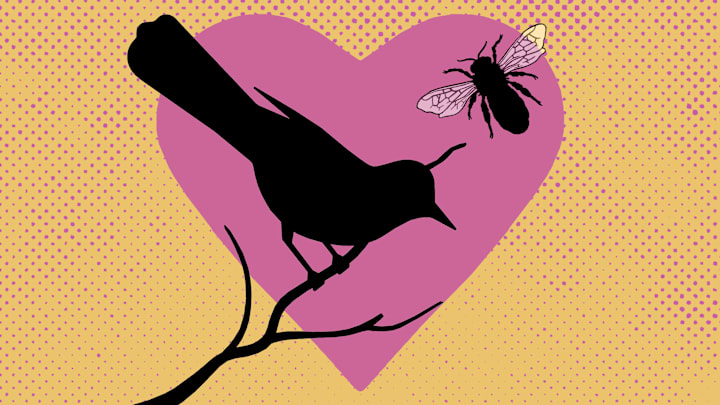The phrase the birds and the bees is hazy by design. It’s used to tell children about the mechanics of human sex without actually mentioning sex or humans. It's prudish poetry that has somehow endured throughout the years, but its origins, like its definition, aren't entirely clear.
Origins in English Literature
The term is thought to have two possible origins, according to the Los Angeles Times. The Romantic poet Samuel Taylor Coleridge is credited with referring to the two animals in the context of love in his 1825 poem “Work Without Hope”:
“All Nature seems at work. Slugs leave their lair—
The bees are stirring—birds are on the wing—
And Winter, slumbering in the open air,
Wears on his smiling face a dream of Spring!
And I, the while, the sole unbusy thing,
Nor honey make, nor pair, nor build, nor sing. ... ”
Unfortunately for Coleridge, this fleeting passage had a lasting legacy, and his jealousy of local birds and bees has been etched into eternity.
However, University of Southern California linguistics professor Ed Finegan found an earlier use of the phrase in the Diary of John Evelyn, a chief source of historical information about life in 17th-century London. In describing the interior of St. Peter’s Basilica in Rome in the 1640s, Evelyn wrote:
“That stupendous canopy of Corinthian brasse; it consists of 4 wreath'd columns—incircl'd with vines, on which hang little putti, birds and bees.”
Finegan suggested that birds and bees appearing so close to putti (a.k.a. cherubs) implied that Evelyn was alluding to human sexuality. And because Evelyn’s Diary was published around the time that Romantic poets were active, the writers were likely inspired by this phrasing and made it into a euphemism.
The Birds and the Bees Crosses the Pond
An early use of the birds and the bees in an American publication occurred just after the start of the Civil War. A New York Times correspondent at the U.S. Capitol remarked on the lusty quality of spring in Washington, D.C.:
“It is a warm, sunny day, this 20th day of April. The air is redolent of bursting buds, and the Capital Park is jubilant with the gushing songs of the birds and the humming of the honey-bees. The Northern air that has ‘aggressed’ upon us for a week past has been driven back by the rebellious South wind, that comes, fresh from the fair faces it has caressed, and the waving tresses through which it has wantoned, to enchant the soul with its balmy breath, and entrance the mind with its dreamy sweetness.”
The convoluted origins of the birds and the bees may inspire you to skip the phrase altogether the next time a child asks you where babies come from.
Check Out More Word and Phrase Origins:
A version of this story was published in 2014; it has been updated for 2025.
